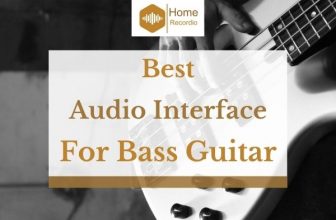Audio Interface vs Guitar Amplifier – Which One To Choose?
There are many ways to play your guitar and create the sounds you want to hear. In fact, audio equipment can help take your playing to the next level.
However, if you are new to guitars, you might be wondering which audio equipment is right for you.
In this post, I’ll be going over two popular audio equipment options for guitar players.
Typically, many electric guitar players opt for amplifiers, also known as amps, to create and play live music.
But there is a second option you can go with. Audio interfaces connect your instrument to a computer and let you play your guitar this way.
You can also record your instrument through this type of setup.
I’ll get more into the pros and cons of audio interface and amps throughout this post, though.
[amazon table=”7331″]Table of Contents
What is an Audio Interface and How Does it Work?
Video: “What is an Audio Interface — Do I Need One?”
Audio interface devices are used in many studio setups. These tools can be used for music production, recording, and editing. However, you can also use an audio interface to play your guitar.
An audio interface is hooked up to your guitar and allows you to connect your instrument to your computer.
With an interface, the sounds of your guitar playing can be heard through your computer system.
In addition, you can also plug-in headphones into your interface and play your guitar this way.
In some instances, you can even hook up monitors and speakers to your computer to enhance the sound of your guitar.
Overall, audio interfaces are a great way to play guitar. And, if you do a lot of music production or recording, this is a great device to have as a guitar player.
You won’t be able to play your guitar as seamlessly, of course. As you have to boot up your computer and set up your audio programs first.
But there are pros and cons to this type of device like any other!
- Good if you can’t turn up an amp and need to practice on your own
- You can record and even edit your guitar sessions with an audio interface
- It’s easy to plug in your headphones and jam out with the audio interface
- You can set up your own sound system with an audio interface
- Not ideal if you want to do live performances
- Not the best option if you are going to practice playing with other musicians
- Small delay in sound when using an audio interface and you have to boot up your computer
Check Price and Reviews on Amazon
What is a Guitar Amplifier and How Does it Work Specifically?
Video: “How To Choose a Guitar Amplifier – Electric Guitar Amp Buying Guide!”
Guitar amps are pretty straight forward with how they work. And, most serious guitars players have an amp in their collection.
This device is used to amplify the sound of an electric guitar. You plug your instrument into the amp and the sound of your guitar is smoothly and immediately heard.
You can also adjust the sound of your guitar with the various knobs and sound controls found on an amp.
Like audio interfaces, the quality of an amp depends on the manufacturer of your device. Some amp makers are better than others.
But, overall, amps are perfect for guitar playing. Especially if you play in a band or plan on doing many live performances. You want to consider getting one of these products.
Amps can cost a lot of money. But I suggest investing in a high-quality amplifier for your guitar!
You won’t be able to record music or edit music with an amp like you can with an interface. However, there are many positive points that come with amps.
Chiefly, you can plug in your instrument and start playing right away. This can make you more motivated to practice and get you more into the flow of playing.
- Amps are ideal when practicing with a band
- Amps are great for live performances
- You can plug in your guitar and play right away with an amp
- Sound quality can be better with amps and there is no sound delay
- Amps can be pretty loud especially if you live in a quiet neighborhood
- High-quality amps cost a lot of money
- Tons of different amps to choose from, this can be confusing for beginners
Check Price and Reviews on Amazon
Which is Better For Guitars, Audio Interface or Amp?
Audio interfaces and amps both have their pros and cons for guitar players. So, the answer to this question will depend on what you are trying to do with your guitar.
Still, guitars amps are considered a staple for many guitar players. Really, a guitar amp is easy to use and requires almost no setup.
You just plug in your guitar and set the sound to the settings you like. This can be a major benefit for guitar players.
Using an audio interface can be convenient, as well. But there are some downsides to this option. Most audio interfaces will create a lag in sound when you play.
And, it can be harder to practice with other musicians and even play live shows with an audio interface. Still, audio interfaces allow you to play your guitar with the assistance of any computer.
And you can use headphones while you play and even edit and record your music. So, consider all of this when you are choosing which product to get!
[amazon table=”7331″]Conclusion
You want to choose the right sound equipment for yourself when you get your guitar. Most players either have an amp or an audio interface device.
But, I went over both products here in detail. This way you can decide which equipment is right for you and your instrument. Guitars players can benefit from either setup.
Both amps and audio interfaces can help musicians grow and discover their talent.
Still, you will want to consider your circumstances and needs when choosing between an audio interface vs amp for guitar.
Hopefully, I have made this decision a little easier for you, though! And if you are still confused, go back and reread both sections on audio interfaces and amps!




